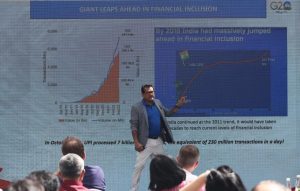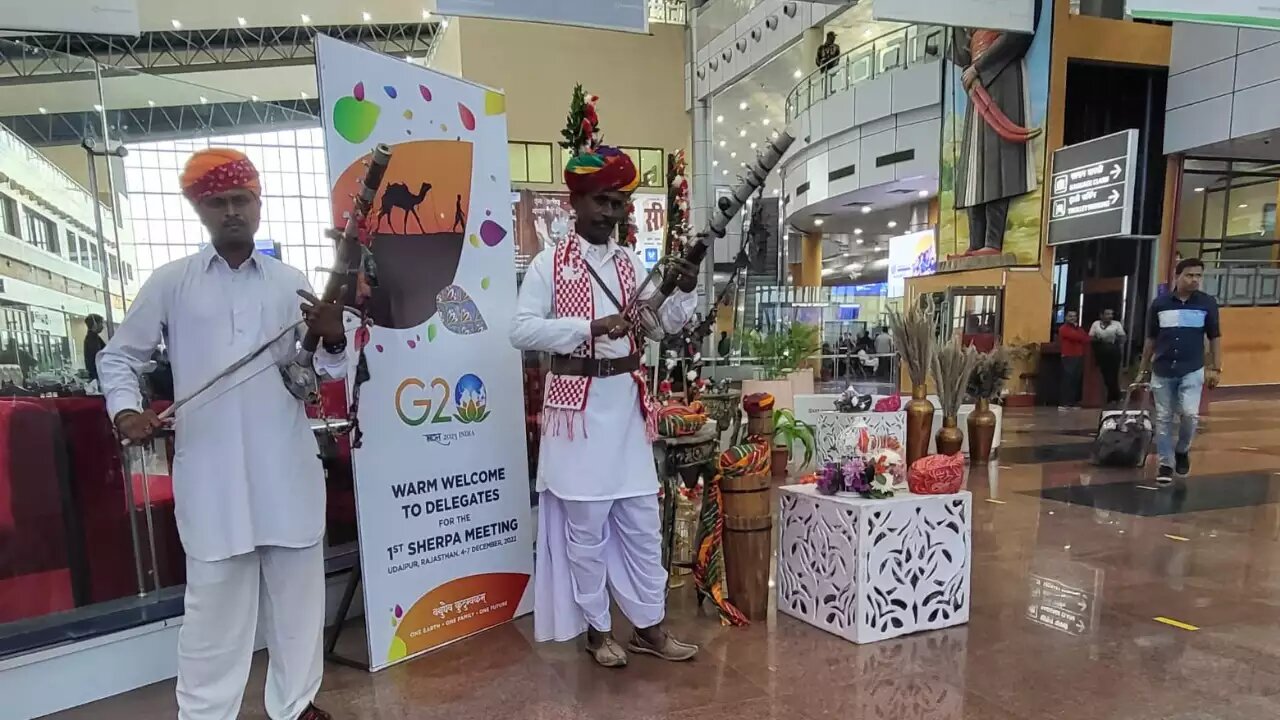The first test of G2O unity under India’s G20 presidency will be at the December 4-7 Sherpa Meeting in the scenic lake city of Udaipur. Given bitter acrimony in meetings ahead of the Bali summit, it will be reassuring to see sherpas of all G20 countries posing for a group photo and agreeing on a joint statement, says Manish Chand

India’s much-awaited G20 moment is finally here, with the world’s fifth largest economy assuming the presidency of the world’s richest and powerful countries on December 1, 2022, triggering a G20 media blitzkrieg and a carnival of patriotism. Heading the world’s most influential multilateral forum is an occasion for national rejoicing and is projected as a symbol of India’s growing global stature and prestige, capable of straddling the North-South divide. But amid this euphoria, it’s important to sift hype from substance and take a reality check on what India can achieve during its year-long G20 leadership. Here are five reasons why India’s G20 presidency is critically important, and can be a watershed moment for the country’s rise as a responsible global player, offering solutions to a host of global crises and challenges.
Bridge-builder & Healer:
With strong geopolitical polarizations emerging across the North-South and the East-West divide, India’s presidency of G20 can be decisive in bolstering the grouping’s status as the world’s most effective multilateral forum, not only in the economic arena but also in the field of conflict resolution. Although India manged to help forge a tactical compromise on the Ukraine issue at the G20 summit in Bali by finding a mid-way solution that accommodated concerns of Russia as well as the West, the Ukraine war will continue to pose a challenge to the G20 solidarity. Going forward, India will have to do heavy diplomatic weightlifting to keep the warring parties on the same page and to keep G7 countries to the Bali Declaration formulation on Ukraine which criticised Russia but at the same time acknowledged differences on the issue.
In this regard, the first test of G2O solidarity will be at the December 4-7 Sherpa Meeting in the scenic lake city of Udaipur, the first major preparatory meeting being held after the assumption of G20 presidency by India. The sherpas of all G20 countries, including Russia, are expected to attend. Going by dissonance in meetings ahead of the Bali summit, it will be reassuring to see all sherpas posing for a group photo and agreeing on a joint statement. The stakes are high for everyone, but more so for India. India will play the role of a bridge builder between countries which are divided over the Ukraine conflict so that G20 can focus on major priorities of India’s presidency, including accelerating Sustainable Development Goals (SDGs), reviving economic growth and generating the much-needed climate finance. Firewalling G20 from the Ukraine crisis and steering G20 in the direction of problem-solving to issues such as food and fuel prices could be one of major achievements of India’s G20 presidency, which will buttress the country’s credentials as a unifier and healer in a hopelessly splintered world.
Bridging Digital Divide

The G20 presidency will also see India entrenching its credentials as a digital superpower which can leverage its unique digital public goods for benefits of people across geographies. Bridging the digital divide, especially in developing countries, will be critical to ensure that benefits of the digital transformation are not confined to a small part of the human race and are shared with developing countries, as India’s G20 Sherpa Amitabh Kant has argued. Promoting digital inclusion will be therefore a high priority for India. In this context, India will showcase transformational digital tools devised in the country such as UPI, Co-WIN, Ayushman Bharat, FASTag and ONDC. Digital public goods will be an important part of what G20 Chief Coordinator Harsh Vardhan Shringla has aptly called an inclusive tech order which seeks to create technologies to deliver better services to people.
People’s G20
Transforming G20 into a people-led movement for creating better lives of people could potentially become a lasting legacy of India’s G20 presidency. In the over 200 G20-related events that will be organised across the country, from Kashmir to Kanyakumari, involving civil society, students and women will promote greater people’s participation.

For thousands of international delegates attending G20 events, it will be their first experience and taste of India, bringing them face to face with ordinary people. It is in this spirit that PM Modi has proposed “jan-bhagidari” “partnership with people” model in organising G20 events so as to convey to people about benefits of India’s G20 membership and G20 presidency. In this regard, a massive outreach to students and universities entitled “University Connect” was organised recently to familiarise them with various aspects of India’s G20 presidency.
Voice of Global South
The long-term enduring legacy of India’s G20 presidency will be the prioritisation of the interests of the developing world and the Global South on the G20 agenda. With the Ukraine crisis affecting developing countries in Asia and Africa disproportionately due to spiralling food and fuel prices, India will strive to protect and promote the interests of the global South. It is in this spirit that India has invited six developing countries, including Bangladesh, Mauritius, Oman, the UAE, Nigeria and Egypt, as guests to the G20 summit in Delhi in September 2023. With developing countries holding the G20 presidency till 2025 – Indonesia in 2022, India in 2023, Brazil in 2024 and South Africa in 2025 – it’s an ideal moment for India to refurbish its well-recognised credentials as a voice of the global South.
Reforming Global Institutions
Making global financial governance institutions more democratic and representative of ongoing shifts in the world order will be a major priority of India under its G20 presidency. Institutions such as the World Bank and IMF continue to remain the bastion of the West and need to provide greater representation and weight to emerging and developing countries in order to stay relevant.
As India will be leading G20 at a time of escalating global tensions, it will have to take the leading in forging an inclusive and equitable world order, with reformed multilateralism at its core. In this regard, India will focus on promoting human-centric globalisation and makes its G20 presidency a presidency of “healing, hope and harmony,” as PM Modi has said. This is the essence of the credo of India’s G20 membership, pivoted around the theme of “One Earth, One Family, One Future” and crystallized in the ancient Sanskrit ethos of “Vasudhaiva Kutumbakam.”
(Manish Chand is CEO-Editor-in-Chief, India Writes Network, and India and The World magazine. He is Director, Centre for Global Insights India, a think tank focused on global affairs)
Author Profile

- Manish Chand is Founder and Editor-in-Chief of India Writes Network (www.indiawrites.org) and India and World, a pioneering magazine focused on international affairs. He is CEO, Centre for Global India Insights, an India-based think tank focused on global affairs.
Latest entries
 India and the WorldFebruary 27, 2026Modi visit: India-Israel partnership enters a new era
India and the WorldFebruary 27, 2026Modi visit: India-Israel partnership enters a new era India and the WorldFebruary 24, 2026Unravelling Modi’s Israel journey: What to expect
India and the WorldFebruary 24, 2026Unravelling Modi’s Israel journey: What to expect India and the WorldFebruary 17, 2026South-by-South: Focus on people-centric solutions at India AI summit
India and the WorldFebruary 17, 2026South-by-South: Focus on people-centric solutions at India AI summit India and the WorldFebruary 7, 2026Modi hails interim India-US trade deal, Goyal says no concessions made on agriculture
India and the WorldFebruary 7, 2026Modi hails interim India-US trade deal, Goyal says no concessions made on agriculture







